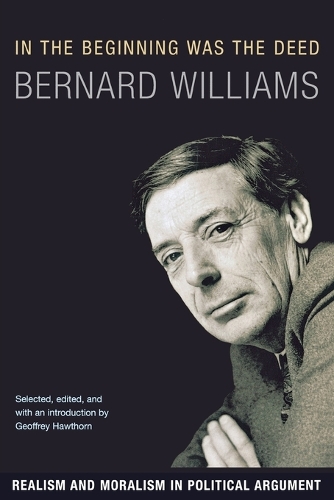
In the Beginning Was the Deed: Realism and Moralism in Political Argument
(Paperback)
Publishing Details
In the Beginning Was the Deed: Realism and Moralism in Political Argument
By (Author) Bernard Williams
Edited by Geoffrey Hawthorn
Princeton University Press
Princeton University Press
18th February 2008
United States
Classifications
Professional and Scholarly
Non Fiction
Political science and theory
Ethics and moral philosophy
Western philosophy from c 1800
320.01
Physical Properties
Paperback
196
Width 152mm, Height 235mm
312g
Description
Bernard Williams is remembered as one of the most brilliant and original philosophers of the past fifty years. Widely respected as a moral philosopher, Williams began to write about politics in a sustained way in the early 1980s. There followed a stream of articles, lectures, and other major contributions to issues of public concern--all complemented by his many works on ethics, which have important implications for political theory. This new collection of essays, most of them previously unpublished, addresses many of the core subjects of political philosophy: justice, liberty, and equality; the nature and meaning of liberalism; toleration; power and the fear of power; democracy; and the nature of political philosophy itself. A central theme throughout is that political philosophers need to engage more directly with the realities of political life, not simply with the theories of other philosophers. Williams makes this argument in part through a searching examination of where political thinking should originate, to whom it might be addressed, and what it should deliver. Williams had intended to weave these essays into a connected narrative on political philosophy with reflections on his own experience of postwar politics. Sadly he did not live to complete it, but this book brings together many of its components. Geoffrey Hawthorn has arranged the material to resemble as closely as possible Williams's original design and vision. He has provided both an introduction to Williams's political philosophy and a bibliography of his formal and informal writings on politics. Those who know the work of Bernard Williams will find here the familiar hallmarks of his writing--originality, clarity, erudition, and wit. Those who are unfamiliar with, or unconvinced by, a philosophical approach to politics, will find this an engaging introduction. Both will encounter a thoroughly original voice in modern political theory and a searching approach to the shape and direction of liberal political thought in the past thirty-five years.
Reviews
"A splendid expression of Williams's distinctive outlook, which joined a conviction that moral argument is important in politics with an insistence that we keep our eyes firmly fixed on the real political world... [S]harp, funny and incisive."--Thomas Nagel, Times Literary Supplement "In this collection, as in all of his other works, Bernard Williams shows how much more interesting our philosophic reflections on the problems of human life can be when they begin with life's most mundane and unavoidable experiences."--Bernard Yack, Ethics "Characteristically, all of the essays are closely argued, elegantly written, and strongly engaging. The book is a welcome addition to the literatures on the many issues it addresses."--Richard E. Flathman, Perspectives on Politics "This collection of essays is well-written, challenging and highly enjoyable. It has the searching, inquisitive and witty style typical of its author, with scores of ideas and insights briefly alluded to without further development, making for engaging reading."--Chris Nathan, Oxonian Review
Author Bio
Bernard Williams's books include "Truth and Truthfulness" (Princeton); "Making Sense of Humanity"; "Morality"; and "Ethics and the Limits of Philosophy". At the time of his death in 2003, he was Fellow of All Souls College, University of Oxford. Geoffrey Hawthorn is Professor of International Politics at the University of Cambridge.
